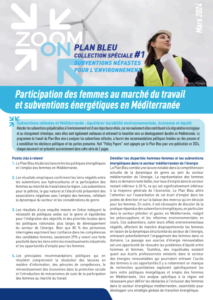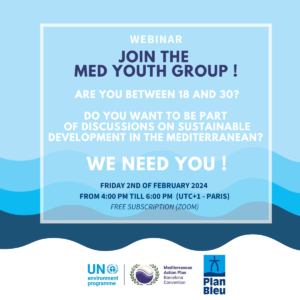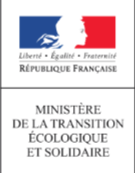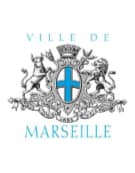1 Context and objectives
About Plan Bleu:
This consultation is published by Plan Bleu, Regional Activity Center of the Mediterranean Action Plan (MAP), established in the form of a French association in Marseille, France. The MAP is one of the main components of the Regional Seas Programme of the United Nations Environment Programme (UNEP). It has a legal instrument: the Barcelona Convention and relies on six regional activity centres (“RACs”) responsible in particular for promoting the implementation of the various protocols attached to the convention. Plan Bleu is one of these six centres mandated by the twenty-one countries Parties to the Barcelona Convention and the European Union (Contracting Parties to the Barcelona Convention). Plan Bleu acts as an observatory of the environment and sustainable development in the Mediterranean, and conducts thematic, systemic and prospective analyses to enlighten decision-makers of the region on the environmental risks and the challenges of sustainable development.
About NaTour4CChange:
The Interreg Euro-Med NaTour4CChange project (2024-2026) started in January 2024 and will build on successful experiences at the Mediterranean and global level to test solutions for increasing the resilience of coastal destinations in the Mediterranean. The project will set common methods to allow participating regions to assess their tourism-related climate adaptation and mitigation priorities, and take climate action via plans and strategies, supported by cooperative governance. In coastal destinations, cross-sector teams will deliver specific tourism climate action plans, focusing climate adaptation, where Nature-based Solutions will be tested to ensure their feasibility, while innovative destination marketing and communication approaches will engage private stakeholders, visitors, and residents in climate action. The project will also ensure a cross fertilisation among participating regions and destinations, to achieve common methods and to compare the different tested plans and solutions, which will lead to lessons, best practices, and policy recommendations.
In the framework of NaTour4CChange, Plan Bleu coordinates the WP1 “Methods and Learnings” that aims at creating the methods and sharing progress and learnings, designing the Climate Change action planning for project’s Regions and improving the Climate Change-related resilience of pilot tourism destinations.
As part of Activity 1.4, Plan Bleu coordinates the development of common methods to be applied by each project Region (focus on adaptation and mitigation) and Destination (focus on adaptation) to identify and assess coastal tourism-related issues concerning the climate change mitigation and adaptation in tourism at Regional and Destination level, in synergy with Activity 1.3 – A survey of available best practices on climate action in coastal tourism destinations also led by Plan Bleu, and in close collaboration with other activities coordinators such as the Conference of Peripheral Maritime Region (CPMR) which leads Activity 1.5 – Approach for drafting Regional and Destinations Tourism Climate Strategies and Plans and Activity 1.6 – Approach for defining the enabling conditions for tourism climate action in regions and IUCN-MED which leads Activity 1.7 – Approach to implement NbS approaches to be tested at Destination level. The Consultant will be expected to interact with CPMR’s external expert that will be in charge of Activity 1.5 and Activity 1.6 and with other project partners involved in this activity.
2 Task description
The objective of the present call for applicants is to select an expert to support the elaboration of two methodological frameworks:
- A methodological framework for assessing coastal tourism related issues concerning climate change mitigation and adaptation, to be used in each project’s pilot Region (focus on adaptation and mitigation).
- A methodological framework for assessing coastal tourism related issues concerning CC, to be used in each project’s pilot Destination (focus on adaptation).
This activity will be developed under the coordination of Plan Bleu and will be included in the training for Regions and Destinations (Activity 1.9 – Capacity development of pilot Regions and Destinations and Experience Exchange), coordinated by IUCN and technical partners.
In terms of deliverables, this activity should lead to the production of two distinct methodological frameworks at Regional level and at Destination level. These deliverables must be actionable and evidence-based, providing sound and agreed set of criteria that will allow each Regional partner, taking into account the common methods provided in WP1, to perform the relevant assessments (considering existing evidence and certified data) concerning regional tourism contribution to Climate Change and coastal tourism related issues regarding the adaptation of the region to Climate Change. The methodological framework for Regions should consider existing assessments within a Regional Climate Adaptation/Mitigation Action Plan to provide guidelines on how to move to an integrated, more sectoral approach for Tourism. This will be an important milestone to provide the evidence for the preparation of the Regional Climate Strategy (Activity 2.4 – Identification and assessment of the coastal tourism-related issues concerning climate change mitigation and adaptation of each Regional territory).
Methodology:
The proposed methodology includes the following steps, that could be refined and improved in the applicants offers:
- A literature review and assessment through a desk analysis of existing initiatives/projects/methodologies and publications related to climate change impacts on the tourism sector to establish a solid knowledge baseline. Plan Bleu and other project partners will provide recommendations from past relevant Interreg Med projects to be considered (e.g. MPA ENGAGE, MPA ADAPT, DESTIMED PLUS, etc.).
- Developing a set of standardised and harmonised criteria to assess coastal tourism-related issues concerning CC adaptation in tourism for Regions and another set of criteria for Destinations. Those criteria should be declinable for regional and destination sites through a bottom up approach (from the destination to the regional level).
- Proposing indicators on climate change adaptation, in accordance with the list of indicators provided in the CLIMATE-ADAPT platform that are easy to identify and to monitor temporally and geographically, and that could help collect data and fill the knowledge gaps.
As part of point 3, the proposed process for suggesting indicators that could be refined based on time and data availability constraints is the following: 1) systematic literature review on climate change adaptation and indicators, 2) interviews with expert sector, 3) discussions with project partners.
At Regional level, special attention should be paid to governance level issues, strategies and plans on climate change and how they interact with the tourism sector (regarding the different types of tourism activities, tourist expectations, etc.) and if they do not, how this can be corrected through specific and general recommended actions. The work will capitalise on previous results and initiatives (e.g. Interreg Med projects). At the Destination level, a more flexible approach related to governance issues should be considered linked to specific governance, socio-economic and environmental contexts.
Understanding the impact of climate change on Mediterranean coasts requires a thorough analysis of climatological data, including biophysical parameters. These parameters play a crucial role in identifying and tracking environmental trends related to global warming, changes in precipitation patterns, extreme weather events, rising sea levels, coastal erosion, and loss of biodiversity, among others. Analysing these trends is vital for grasping the different factors that cause changes along the Mediterranean coastlines. The findings from such analyses are crucial for creating adaptation strategies for coastal tourism in the Mediterranean, managing resources effectively, and designing policies aimed at fostering a sustainable relationship with the environment. These measures are essential to reduce the environmental footprint associated with these activities.
3 Expected schedule
| Mid April 2024 | Formalisation of the contract |
|
| April– June 2024 | Working on the activities |
|
| End of May 2024 | Submission of first draft |
|
| Mid June 2024 | Submission of the expected deliverable |
|
4 Selection of the expert
Plan Bleu is seeking a seasoned consultant with strong interpersonal skills and previous experiences in conducting work on sustainable tourism and climate change adaptation issues in coastal destinations. The following criteria will be assessed:
Experience:
- Relevant experience (> 10 years) in the field of sustainable tourism, with good knowledge of climate change adaptation issues for coastal destinations.
- Minimum of 5 years of working experience in and specific knowledge of environmental issues (terrestrial and maritime ones) in the Mediterranean.
- Experience in designing methodological frameworks for assessing coastal tourism issues relating to climate change mitigation and adaptation at different spatial scales.
- Experience in the Mediterranean region strongly desired and a good knowledge of actors and multi-level governance processes in Mediterranean countries.
Competences:
- Excellent analytical, synthesis and writing skills in English. Knowledge of other Mediterranean languages is a plus.
- Ability to mobilise and to criticise the information and the existing knowledge in an efficient way.
- Knowledge of the Mediterranean Basin and stakeholders related to sustainable tourism with a focus on climate change adaptation issues.
The selection of the expert will be done based on a presentation of a technical offer, an economic offer, as well as a letter of interest and a resume making reference to these Terms of Reference.
5 Contractual and financial terms
The acceptance of the offer of the successful tender will implicate the acceptation of the conditions and schedules detailed in this ToR.
A duly-issued invoice will be required for payment at the presentation of the final document. The payment term for the invoice will be by bank transfer 15 days after the invoice date (bank account details should be detailed).
The tax legislation in force at the date of acceptance of the offer will be applied.
6 How to apply
- Applications must be submitted by 7th April 2024
- Applications must be submitted through Plan Bleu website: www.planbleu.org and by e-mail at: [email protected]
- Applications must contain a technical offer, an economic offer (in Euros) including VAT if needed, as well as a letter of interest and a resume making reference to these Terms of Reference.















